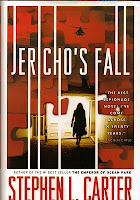"By definition, if a thriller does not thrill, it is not doing its job" David Hewson, Welcome of Thrillers: 100 Must Reads.
Stephen L. Carter’s fourth novel, Jericho’s Fall (Alfred A. Knopf, $25.95 (hardcover), 355 pages, ISBN978-0-307-27262-I), a thriller about the danger of using secrets as bargaining chips, lacks the heart pounding, fast pace, danger- around-every-corner of the thriller that keeps you on the edge of your seat.
Jericho Ainsley, a dying former Secretary of Defense and Director of Central Intelligence, is threatening to reveal either government secrets or secrets involving a scandal in the investment firm for which he worked after retiring from government service. He warns former colleagues and enemies in the United States and Europe that if “Jericho falls” or if any member of his family is harmed, including his former lover, he’ll reveal their secrets. As a result some people (mysterious “they”) want to know what he knows and some want him dead.
Rebecca DeForde, the central character through whom the reader witnesses the unbelievable action, is his former lover. She has not seen or heard from Jericho for 13 years. Now 34, she first met him when she was a 19-year-old sophomore in Princeton, and he was one of her professors. He seduced her, and they had an 18 month relationship before she broke it off because of his cheating on her and his wife. When Jericho calls, she leaves her six year daughter with her mother in Florida and rushes to mansion-fortress in Colorado. Jericho tells her about the secret information and explains that he wants her to find where he has hidden it. He knows where it is but, because he likes to play games and manipulate people, tells her she must figure it out for herself, and she must not tell his two daughters why he summoned her. He does not tell her what she is to do with the information.
Jericho’s Fall is the worse of Carter’s four novels. Rebecca, with no experience in dodging bad guys and in using reason to solve puzzles, such as Jericho wants her to do, is an unbelievable character in an unbelievable plot.
The “Director of Everything,” as the author refers to Jericho, is a very sick man whose cancer has attacked his brain. Yet, he often has lucid moments, enough so that he can still scheme and manipulate people. Moreover, no one knows Jericho has the secrets until he reveals it. Carter apparently expects the reader to believe that Jericho was in one of his diseased-mind moments when he informed old enemies and friends that he had secrets which could destroy them. Yet, in one of his lucid moments, he certainly knew Rebecca and his two daughters were in danger and kept warning Rebecca but not his daughters.
With one exception, the characters in Jericho’s Fall are all white. This is not a criticism, for I believe that black writers can create white characters, and white writers are very capable of creating black characters. I merely note that Carter deviates from his integration of black and white characters in his three previous novels.
As I was reading the novel, I did not care if Rebecca found the secret information or what would happen to her when she did. Jericho’s Fall does not do what a good novel should, entertain the reader.

No comments:
Post a Comment